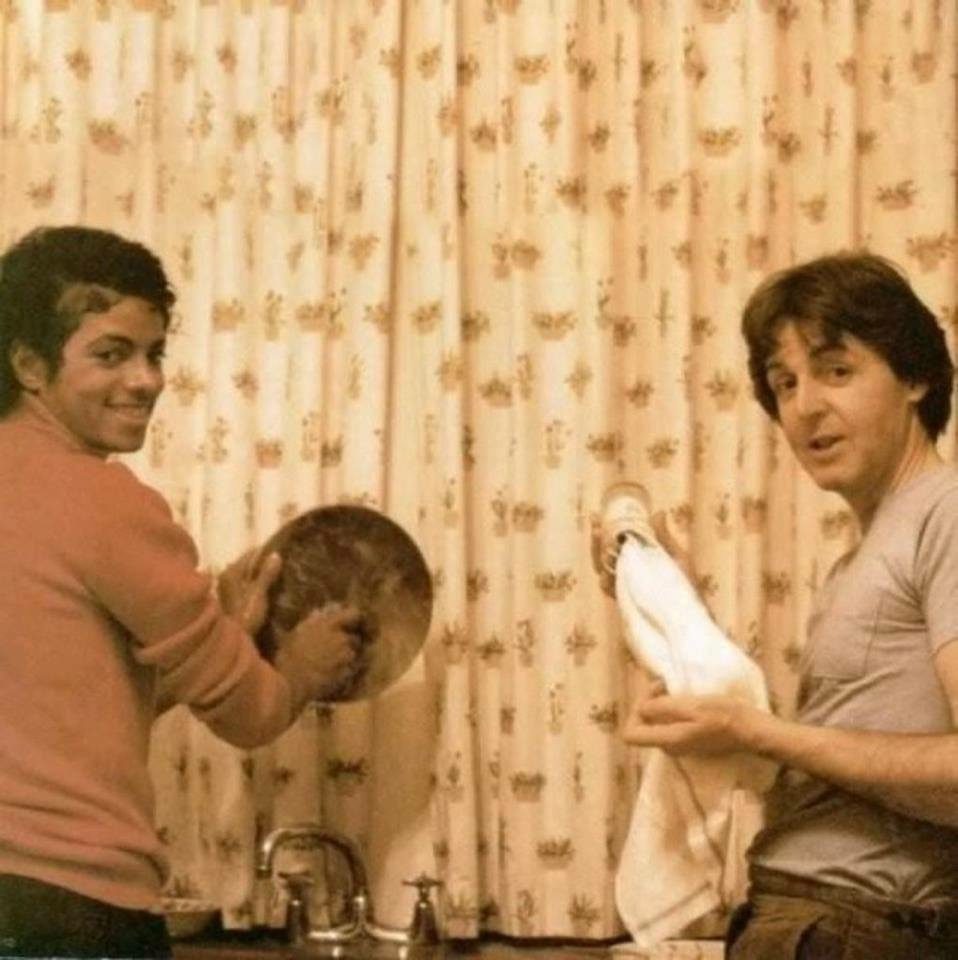
Amidst the kaleidoscope of the 1980s, with its intoxicating beats and larger-than-life music videos, a single photograph emerged that, in its simplicity, said more about a partnership than a thousand words could. It wasn’t set against the backdrop of an opulent stage or amidst the frenzy of adoring fans. Instead, it captured two of music’s most monumental figures, Michael Jackson and Paul McCartney, washing dishes.
At first glance, the image appears almost pedestrian, even jarring in its ordinariness. There they were: Jackson, the undeniable King of Pop with his glittering glove and moonwalking prowess, and McCartney, the legendary Beatle who had provided the soundtrack for a generation’s revolution, hands deep in soap suds, scrubbing away. No entourage, no stage makeup, just two friends sharing a candid, genuine moment.
The photograph was snapped during the making of the music video for “Say Say Say,” the duo’s 1983 chart-topper from McCartney’s “Pipes of Peace” album. The song itself is a sonic delight, a harmonious blend of McCartney’s melodic touch and Jackson’s unique vocal artistry. But this image, worlds away from the video’s 1930s con-artistry narrative, presents a stripped-down, behind-the-scenes camaraderie. It’s a testament to the genuine affection and mutual respect the two artists held for one another during this collaborative phase.
However, beneath the sheen of their musical collaborations lurked the undercurrents of business decisions that would later strain their friendship. It began innocuously enough; McCartney had shared with Jackson the financial wisdom of investing in music publishing. Little did McCartney realize that Jackson would take this advice to heart in a grand way. In 1985, Jackson astutely acquired ATV Music Publishing, which, notably, owned the rights to the majority of The Beatles’ back catalog. This acquisition, reportedly costing Jackson around $47.5 million, didn’t sit well with McCartney. The Beatles’ catalog was not just a lucrative asset, but a cherished collection of memories and milestones for McCartney. The fact that Jackson now controlled a significant part of The Beatles’ legacy was a pill too bitter for McCartney to swallow.
This business move undoubtedly cast long shadows over their personal relationship. What was once a warm, collaborative bond became overshadowed by feelings of betrayal and missed opportunities. McCartney had hoped to regain the rights to The Beatles’ songs, and Jackson’s acquisition was a move he hadn’t anticipated from a friend.
Today, the image of Jackson and McCartney washing dishes serves not only as a memento of their musical collaboration but as a symbol of a fleeting moment in time — when two giants from different musical worlds converged in pure, unscripted friendship. For those who stumble upon this snapshot, it’s a tender reminder that music’s most touching narratives aren’t always found in lyrics or melodies but sometimes in the quiet moments in between, and in the complex interplay of friendship and business in the world of music.



Leave a Reply